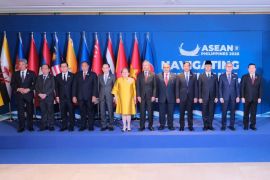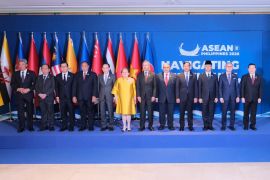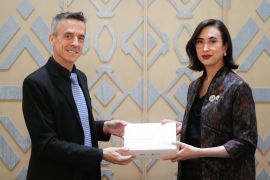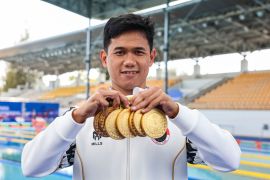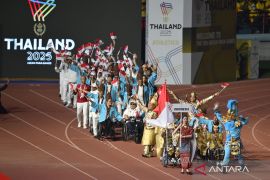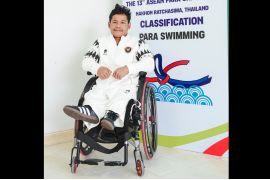Indonesian President Susilo Bambang Yudhoyono said at the opening ceremony of the 14th ASEAN+3 Meeting in Bali Nusa Dua Convention Center many things had happened during the past years starting from security instability to global financial crisis.
Meanwhile, China`s Premier Wen Jiabao who attended the meeting said ASEAN+3 countries need to take stronger measures to enhance cooperation, increase internal growth momentum and deepen cooperation to improve the region`s ways to defeat global crisis.
South Korea`s President Lee Myung-bak in his speech at the Friday meeting expressed concern that the crisis happening in some European countries and the United States might have a negative impact on the ASEAN+3 countries.
"It is important that we take steps to strengthen our financial safety nets. I hope the cooperation under the Chiangmai Initiative will be strengthened in the future," he said.
Earlier in the day, the leaders of ASEAN`s 10 member states met with Japanese Prime Minister Yoshihiko Noda to discuss ASEAN Connectivity, increasing economic relations and efforts to reduce development gaps among ASEAN member states.
Japan expressed its willingness to support the region`s infrastructure development and help maintain the region`s stability.
Japan will financially support development of infrastructure and transportation in ASEAN, the country`s Deputy Cabinet Secretary, Noriyuki Shikata, said.
"We will give support in the form of funding for the development of infrastructures in ASEAN. Basically we support every program that will have positive implications for the region," Noriyuki said adding that a railroad project in Vietnam was an example of a Japan-funded project in ASEAN.
Japan also affirmed its commitment to help maintain stability in Asia and the Pacific, Noriyuki Shikata said.
"We realize that a stable and prosperous Asia Pacific is also essential for us. That is why we made many efforts through various programs to help strengthen intra-ASEAN cooperation in various sectors," he said .
On nuclear energy, Japan planned to reduce its dependence on nuclear energy. "Japan is moving toward a nuclear energy reducing era as much as possible in the medium and long term," Shikata said.
After the Fukushima nuclear reactor incident, Japan revised its current basic energy policy that will be effective until 2030, and to create a new strategy and plan in 2012.
In the meantime, an ASEAN-China Center was officially launched during the 14th ASEAN-China Summit on Friday to strengthen ASEAN-China cooperation in the trade, tourism, education and cultural fields.
"The launching of the ASEAN-China Center marks the 20th year of ASEAN-China relations," Secretary General of the ASEAN-China Center Ma Mingqiang told the press after the ASEAN-China Summit.
The center`s establishment also reflected the resolve of the leaders of ASEAN and China to strengthen the existing cooperation, he said.
The decision to set up the ASEAN-China Center to intensify bilateral cooperation was made by the two sides a long time ago.
The MOU on forming the Beijing-based ASEAN-China Center was signed in 2009 and an ASEAN-China Virtual Center was launched on the sidelines of the 13th ASEAN-China Summit in 2010 in Hanoi, Vietnam.
Meanwhile, the ten ASEAN countries with South Korea on the second day of the 19th ASEAN Summit on Friday signed an agreement in forestry cooperation.
The agreement was signed in the presence of ASEAN Secretary General Surin Pitsuwan on Friday at the Bali Nusa Dua Convention Center (BNDCC) by South Korean Forestry Minister Lee Don Koo and ASEAN ministers who are in charge of forestry.
On behalf of the governments of ASEAN member countries, Surin extended his gratitude to South Korea, which since 2000 has forged a cooperation with ASEAN in forestry sector in the framework of ASEAN-Korea Environmental Cooperation Project (Akecop).
The cooperation was in the form of research to protect the diversity of forest ecosystems in Southeast Asia, and education and training programs for ASEAN community in forestry field.
Besides, cooperation in the forestry sector, South Korea would also help overcome food scarcities in the region.
South Korean President Lee Myung-bak said his country would set up a rice reserve system to ensure the availability of food in the region. "South Korea will play a role in the implementation of a rice reserve system to ensure food security in the region," Lee Myung-bak said during the first session of ASEAN+3 Summit.
Lee Myung-bak said food reserve was a problem that had to be overcome along with the problems of climate and energy scarcities.
He said that natural disasters were one of the causes of food scarcities in the region. Heavy rains and floods in Thailand and Vietnam were proof of the fact that natural disasters could serve as a prelude of food crisis.
"Therefore, we need to cooperate in ensuring food availability," he said. (*)
Editor: Kunto Wibisono
Copyright © ANTARA 2011
